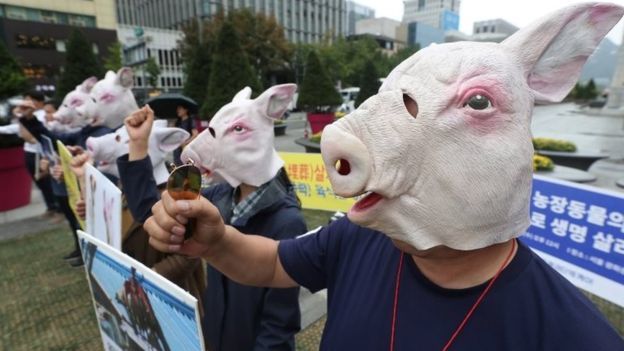 |
| Animal rights activists in Seoul called for an end to the cull on Wednesday |
The virus was only discovered in South Korea recently, and there was speculation it arrived via pigs crossing the heavily-guarded DMZ.
North Korea first recorded ASF in May, and the South made great efforts to keep it out, including border fences.
Despite its name, the DMZ is one of the world's most fortified places.
It is a 4km-wide (2.5 miles) strip of land, laden with landmines, that is a buffer zone between North and South Korea.
More than 10,000 pigs have died or been culled in the South since ASF was discovered. More than six million pigs have been culled overall in Asia.
The virus is not dangerous to humans, but is highly contagious - and incurable - in boars and pigs. According to the UN, the fatality rate is "up to 100%".
It emerged in East Africa in the early 1990s, moved through sub-Saharan Africa, and has also been recorded in Europe.
In August 2018, China - which has half the world's pigs, and where pork is often a staple food - confirmed an outbreak of ASF.
Since then, more than one million pigs have been culled in China, plus more than five million in Vietnam. Farmers in China have been promised compensation for culled pigs worth a minimum of 80% of the market price.
The number of pigs is down by about 40% in China, the AFP news agency reported, and the price of pork is up by at least half.
China has sold 30,000 tonnes from its pork reserves in an effort to increase supply and hold down prices.
Mongolia, the Philippines, Laos, have also culled tens of thousands of pigs in total.
What is the situation in North and South Korea?
The first case of ASF was recorded in North Korea in May. The scale of the outbreak is not known, but South Korea believes the north raises around 2.6m pigs across 14 state-run farms.
Kim Jun-young, from the Korean Veterinary Medical Association in the south, said it was possible the virus had spread through the North, either through the sale of infected meat, or vultures eating infected carcasses.
In June, Seoul said the disease was "highly likely" to enter the country from the North and ordered fences to be built at farms along the border. The South offered quarantine and medical assistance to the North, but had no response.
The South Korean military was authorised to kill any wild boars seen crossing the DMZ.
Despite the precautions, South Korea reported its first case on 17 September - with the total now at 13 - and has culled around 15,000 pigs in response. There are around 6,700 pig farms in South Korea.
Officials are braced for a further spread of ASF with the arrival Typhoon Mitag, which has already led to deaths of six people in the south. BBC
 A boar with African swine fever has been found dead in the demilitarised zone (DMZ) that separates the two Koreas.
A boar with African swine fever has been found dead in the demilitarised zone (DMZ) that separates the two Koreas.